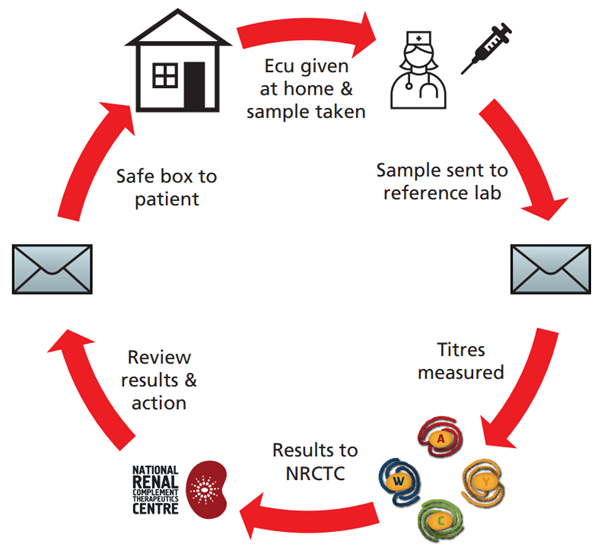Newcastle Hospitals is delighted to announce that the National Renal Complement Therapeutic Centre (NRCTC; https://www.atypicalhus.co.uk/ ), has been shortlisted for the prestigious Acute Sector Innovation of the Year award at the HSJ Awards, recognising an outstanding contribution to healthcare and in particular preventing meningococcal sepsis in patients.
The NRCTC, based in the Royal Victoria Infirmary, is the NHS England highly specialised service for Atypical Haemolytic Uraemic Syndrome (aHUS). They previously demonstrated that this disease was a genetic condition caused by a defect in the immune system which leads to kidney failure.
More recent studies in Newcastle have demonstrated the effectiveness of the drug Eculizumab in preventing kidney failure. Although Eculizumab is very effective it increases the risk of meningococcal sepsis and meningitis requiring long term antibiotic prophylaxis and meningococcal vaccination. Despite this prophylaxis, the team at the NRCTC recently demonstrated a 550 fold increase in this infection.
With a geographically disparate patient group, the aHUS specialist nurses identified a deficiency of local monitoring, potentially placing patients at risk. In the time period 2017-2018 annual measurement of vaccination response was undertaken predominately in the primary care setting and only 57% of patients had this performed.
Working collaboratively with stakeholders including patients, local clinicians, homecare companies and Alexion, new service level agreements across all Trusts were negotiated and implemented. This resulted in an innovative system to increase monitoring of ongoing vaccination response thereby allowing for revaccination to protect patients from sepsis.

This centralised monitoring strategy involved the development of a patient pathway whereby a blood sample could be taken alongside a patient’s eculizumab infusion at home resulting in 97.6% of patients having their response to vaccine measured annually and revaccination undertaken where required. In the follow up analysis no patient developed meningococcal sepsis.
Professor David Kavanagh said: “Nomination for this highly prestigious award highlights the transformative effect our team of highly dedicated specialist aHUS nurses have had in preventing death from meningococcal sepsis in our patients. They identified a problem, designed a novel solution, which is acting as an exemplar to all highly specialized services, and have had demonstrated a clinical improvement in care. Christine, Gemma and Claire should be very proud of their achievement.”
